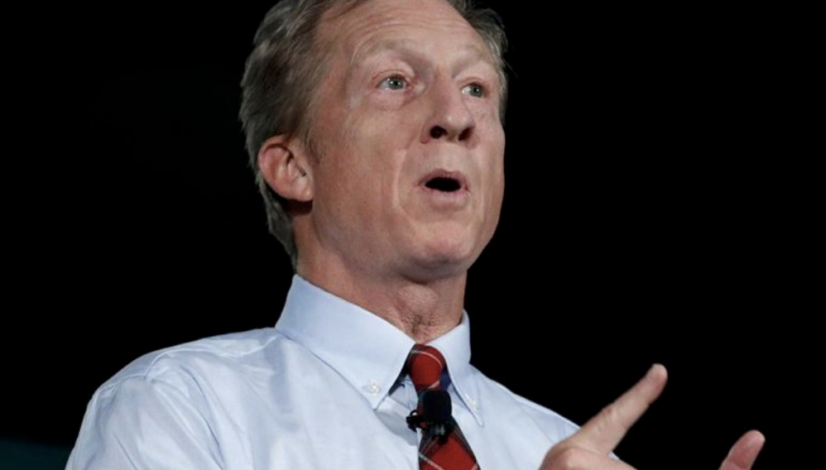Democrats diss young voters on climate change, opening door for a third party candidate

Democrats may have just clobbered their chances of victory in 2020. While all eyes were trained on President Donald Trump’s furious confrontation with China last week, Democrat officials at their party’s convention in San Francisco again voted down a resolution calling for a candidate debate on climate change. That could prove a dire error.
The decision to prevent a climate debate will almost certainly encourage a third-party candidate. And that candidate could sabotage Democrats’ chances of retaking the White House.
Who might it be? It could be former Washington Gov. Jay Inslee, who ran to highlight climate change but recently withdrew from the Democratic nomination race. Or maybe a billionaire like Tom Steyer or Michael Bloomberg, who both similarly want to press Democrats to focus on global warming. They might not expect to win, but their campaigns could elevate the climate discussion.
Remember that the Green Party put Jill Stein forward in 2016. Though few took Stein’s candidacy seriously, in the end she attracted 1.4 million votes. In the aftermath of the election, some blamed her for Hillary Clinton’s loss, pointing out that in the critical swing states of Michigan and Wisconsin, Trump’s margin of victory was less than the number of votes won by Stein.
Since 2016, the climate issue has taken center stage in Democrats’ platforms, becoming especially important to young voters who are playing a growing role in our elections. A Pew Center survey reports that voters under the age of 53 cast 62.2 million votes in the 2018 midterm elections, more than the 60.1 million recorded by people 53 and older. In the midterm contest, Gen Z and millennials made up 25 percent of the total votes cast; their share will increase in 2020.
Young voters are energized, and especially about global warming. A Harvard Kennedy School survey found climate change to be the third most important issue to voters under 30, behind immigration and the economy.
For proof of the importance of young climate enthusiasts, look no further than the Sunrise Movement, an activist group begun only two years ago that has attracted tens of thousands of followers and staged protests in 250 cities around the country. It also takes credit for launching the Green New Deal, which, though widely mocked on the right, has been embraced by nearly every Democratic senator running for 2020.
Sunrise representatives in attendance at the San Francisco convention erupted after the DNC vote to block a climate debate, chanting “Failure of leadership” and “we can’t wait” to protest the complicity of DNC Chair Tom Perez in the decision; many stormed out of the meeting.
Their anger was echoed on social media.
Elizabeth Warren tweeted: “Climate change is an existential threat that threatens (sic) all of us….That’s why we need to have a #ClimateDebate.”
Al Gore chimed in, tweeting: “The Democrats’ decision to sabotage a #ClimateDebate is extremely disappointing. Voters all over the U.S. are demanding we focus on the biggest threat to our nation and humanity’s future and prioritize solving the climate crisis instead of continuing business as usual.”
The hashtag #ClimateDebate trended on twitter in the wake of the vote, with nearly every Democrat hopeful weighing in. Climate warriors Greenpeace participated, tweeting “We just got word that the DNC voted to block a #climatedebate. We can’t begin to tell you how outraged we are… Our political system is failing us, and it’s failing a whole generation of people fighting for a better world.”
Blocking a climate debate was risky for Perez and other Democratic Party officials. They must have known the decision would infuriate young voters, but they also recognized that such a forum could trip up their candidates. They knew that their over-the-top remedies to stem global warming might turn off much-needed independents, guaranteeing Trump’s reelection.
Consider Bernie Sanders’ most recent plan to combat rising emissions, which is projected to cost $16 trillion. In a recent interview, even MSNBC’s liberal Chris Hayes sounded anxious about the scope of Sanders’ proposal, which he described as “really large.” He asked how Sanders would pay for such a mammoth overhaul, which includes “replacing every old diesel school bus, replacing old mobile homes in the country,” in addition to “a federal takeover of the whole thing, that’s essentially a Tennessee Valley Authority extension for the whole country…”
In a rambling response, Sanders explained that his program will be paid for with the money the federal government will make producing sustainable energy (though wind and power production still require subsidies), the elimination of “massive” tax breaks now given to fossil fuel companies, the taxes received from the 20 million new “good-paying union jobs” sure to be created, cuts to military spending, and higher taxes on corporations and the wealthy.
Time does not allow a thorough debunking of this proposal, except to note that green activist group Oil Change International estimates the “subsidies” given to oil and coal producers at $20 billion annually, that the taxes that might be collected on 20 million union workers earning $100,000 apiece would be about $340 million, and that a 50 percent hike in the individual income taxes paid by every American would yield only about $1 trillion. In other words, the numbers don’t add up.
Bernie is not alone, of course. Beto O’Rourke has laid out a $5 trillion plan, and Elizabeth Warren has not one but five climate proposals in the hopper. Joe Biden has put forward a plan that only costs $1.7 trillion, earning him a “C+” grade from the liberal scolds at Mother Jones. And let’s not forget the Green New Deal, estimated to cost north of $50 trillion.
Perez and the Democrat machine are in a tight spot. Either allow Sanders and his rivals to alienate moderate voters by pushing programs that cost the moon, or risk providing a platform for a third party “green” candidate who can mobilize young voters.
On the other hand, the debate could prove illuminating. In the MSNBC interview, Bernie starts off admitting, “Well, the first thing is we cannot not afford it.” Bernie is confused and confusing.
Published on Foxnews.com




